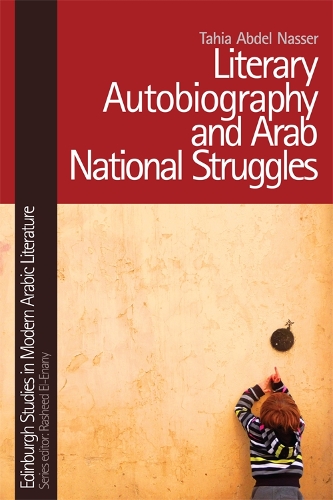
Literary Autobiography and Arab National Struggles
(Hardback)
Publishing Details
Literary Autobiography and Arab National Struggles
By (Author) Tahia Abdel Nasser
Edinburgh University Press
Edinburgh University Press
27th November 2017
United Kingdom
Classifications
Professional and Scholarly
Non Fiction
Memoirs
Literature: history and criticism
809.9335
Physical Properties
Hardback
224
Width 156mm, Height 234mm
483g
Description
In memoirs, Arab writers have invoked solitude in moments of deep public involvement. Focusing on Taha Hussein, Sonallah Ibrahim, Assia Djebar, Latifa al-Zayyat, Mahmoud Darwish, Mourid Barghouti, Edward Said, Haifa Zangana, and Radwa Ashour, this book reads a range of autobiographical forms, sources, and affinities with other literatures.
Taking a comparative approach, Nasser shows the local sources of contemporary Arab autobiography, adaptations of a global genre, and cultural exchange. She also examines different aspects of the contemporary autobiography as it has evolved in the Arab world during the past half-century, focusing on the particularity of the genre written in different languages but pertaining to one overarching Arab culture. Drawing on memoirs, testimonies, autobiographical novels, poetic autobiography, journals, and diaries, she examines solitude and national struggles in contemporary Arab autobiography.
Reviews
Clearly, Literary Autobiography and Arab National Struggles constitutes a significant intervention in Arab and autobiographical studies. The original contribution of Nassers monograph is not limited to providing a fresh perspective on an embargoed genre from the Arab region, to use a Saidian term. An equally significant quality of Nassers study lies in her comparative approach through which she draws from the literary traditions of the Global South to analyze Arab literary autobiographical narratives.' -- Hiyem Cheurfa * Contemporary Review of the Middle East Journal *
The corpus is well-chosen, germane, and spans a range of texts that have never been studied together. The chapter breakdown is extremely interesting in the way it pairs language, location and genre. The methodological framework is highly original in that it reads this multilingual Arab corpus as a complex instance of a fully embodied comparative literature. Moreover, the framing dialectic that moves between the subject's solitude/ belonging is richly productive and offers a new way of thinking about the texts and the tradition they represent." -- Samah Selim, Rutgers University
Author Bio
Tahia Abdel Nasser is Assistant Professor and director of graduate studies in the Department of English and Comparative Literature at the American University in Cairo. She has published in Comparative Literature Studies, Yearbook of Comparative Literature, Alif: Journal of Contemporary Poetics, Journal of Arabic Literature, Dictionary of African Biography (2011), Mahmoud Darwish: The Adam of Two Edens (2001) and The Poetry of Arab Women: A Contemporary Anthology (2001).
